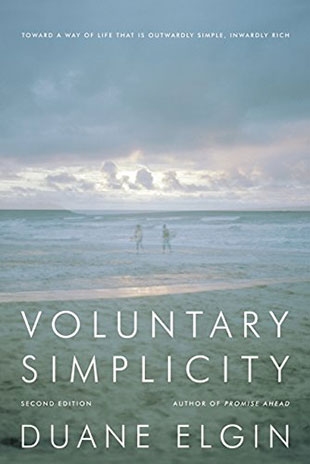Duane Elgin, a former senior social scientist at Stanford Research Institute, defines voluntary simplicity as "a manner of living that is outwardly more simple and inwardly more rich, a way of being in which our most authentic and alive self is brought into direct and conscious contact with living." It relies on our consciously learning skills that enable us to touch the Earth more lightly. It asks that we accept responsibility for developing our human potentials and contributing to the well-being of the world.
This visionary book was first published in 1981 when discussions of sustainability were just beginning. Now as systems are breaking down (see the excerpt) and old patterns are proving to be dangerous and destructive to humankind and the rest of the planet, it is needed more than ever. It's important for people in the twenty-first century to explore the possibilities for renewal inherent in the personal, communal, economic, psychological, and religious dimensions of voluntary simplicity.
